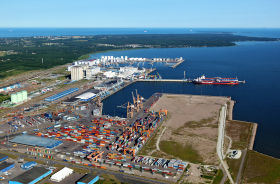Corruption, Estonia, Financial Services, Legislation, Port, Transport
International Internet Magazine. Baltic States news & analytics
Saturday, 20.04.2024, 10:01
By the example of Tallinn Sadam political corruption exists in Estonia
 Print version
Print version |
|---|
"Even though we didn't prove the movement of [money in] plastic bags to party headquarters, this was not our goal either. The report says that just like elsewhere in the world, political corruption exists also in Estonia," Talvik said.
The MP said that corruption risk at port of Tallinn was enabled first and foremost by a weak and over-politicized supervisory board, which did not fulfill the duties assigned to it and did not control the activities of the company's management.
In addition agreements and disagreements between the ruling parties significantly affected the management and operations of the port company, whereas the interests of the company were secondary to political objectives, Talvik said.
Another member of the committee, Social Democrat Andres Anvelt, pointed out that the supervisory board of the port company could have prevented very many negative processes.
"While the supervisory board is not police, they have the substantive possibility to interfere in the work of the management board," Anvelt said. He said the report will prove very valuable if the state observes its many recommendations and proposals in the future.
Center Party MP Jaanus Karilaid meanwhile said that for years politicians ignored the warnings of the Internal Security Service (ISS) and the National Audit Office.
"Nothing was done and politicians paid no attention to shortcomings and corruption at the port. The ministers have not been up to their task. The supervisory board acted in such a haphazard manner because the owner was unable to define its wishes and goals," he said.
As Karilaid said, the Riigikogu investigation committee was unable to identify the party that bears ultimate responsibility because it was an interest of the parties of the ruling coalition to minimize the conclusions of the report and to work against it.
"All the recordings that we made of our conversations with people should be made public," Karilaid said.
Valdo Randpere, the Reform Party MP in the committee, said one of the most important conclusions was that internal audit at state-owned companies should be made independent of the management.
In addition, the period of time that members of the management boards of state-owned companies spend in office should be made shorter if possible. "As one more thing, a system should be developed and put to work where members of supervisory boards are selected via a nomination committee," Randpere added.
Where other members of the committee were convinced that the committee should have looked at the broader picture and not, simultaneously with the investigating authorities, into the concrete acts that former board members of the company are suspected of, Pro Patria and Res Publica Union MP Siim Kiisler found that the committee should have nevertheless looked into the suspicion.
"There was a lot of moving here and there with other topics, but not with the concrete suspicion. This was the weak point," Kiisler said.
The committee held 26 sittings and listened to more than 30 individuals.
The Committee of Investigation to Identify Possible Corruption Risks in the Public Limited Company Port of Tallinn was made up of MPs Artur Talvik, Andres Anvelt, Jaanus Karilaid, Siim Kiisler, Henn Polluaas and Valdo Randpere.








 «The Baltic Course» Is Sold and Stays in Business!
«The Baltic Course» Is Sold and Stays in Business!

